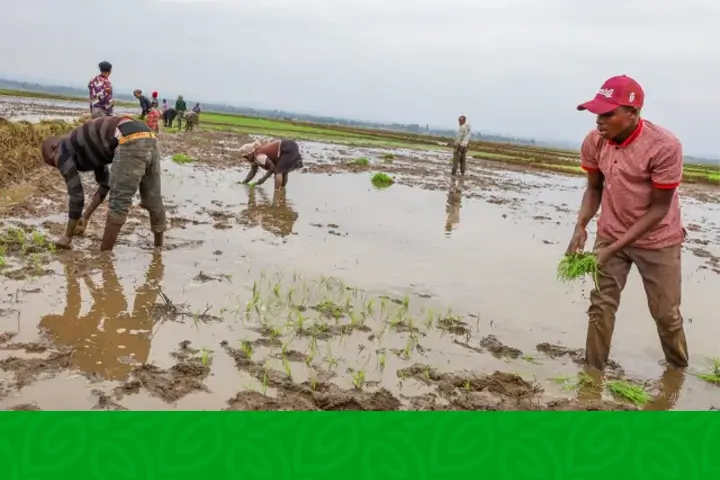
In Kirinyaga County, a new migratory rice pest known as the “Golden Apple Snail” has been wreaking havoc on rice crops in the Mwea irrigation scheme. To combat this invasive snail, the County government, in collaboration with the national government, has initiated a three-week pilot program aimed at containing its spread.
Governor Anne Waiguru has spearheaded the joint action plan, which involves the County Agriculture extension services team and National government officers providing technical support. Through her efforts, the Ministry of Agriculture, via the Pest Control Products Board (PCBP), has supplied 2000 liters of Biograde 300 SL—a biodegradable pesticide—sufficient to cover 8,000 acres of rice paddy during the three-cycle spray. Additionally, 40 sprayers and 40 full PPE kits have been provided to support the pilot control exercise in Mwea.
The pilot program will be conducted in selected farms, utilizing the organic pesticide, in six units—Tebere, Curukia, Thiba, Mwea, Karaba, and Wamumu. The timing is crucial, as the transplanting season is the most critical period for controlling this new migratory rice pest, which has plagued farms for the last four years.
Rice production in the Mwea Rice Irrigation Scheme plays a vital role in national food security and must be protected. The Golden Apple Snail poses a significant threat to food security in the country, particularly during the early seedling stage of the rice crop. Controlling this invasive snail is thus of paramount importance to both the National and County governments.
The success of the pilot program will pave the way for its potential expansion throughout the entire scheme during the ratoon and double crop seasons. Experts from the Ministry of Agriculture emphasize that the snails mainly damage direct wet-seeded rice and transplanted rice up to 30 days old. To effectively control the snails, pesticide application is recommended immediately after transplanting, with repeated applications at 7 and 14 days.
Rose Kamau from the Plant Protection and Food Safety Directorate confirms that Biograde 300 SL is an environmentally friendly and biodegradable pesticide with no pre-harvest harm. Its efficacy has been tested and approved for use in apple snail control.
Rice farmers have praised the initiative taken by the county government, as the snail infestation has spread throughout the entire irrigation scheme. Farmers have struggled for years, attempting to manually control the snail population by handpicking them and crushing egg masses, to no avail.
Apple snails are listed among the “100 of the world’s worst invasive invertebrates of waterways and irrigation systems.” Scientists warn that if left unchecked, the snails could become a serious agricultural and ecological pest, leading to significant economic losses in wetland rice cultivation and threatening biodiversity.
To prevent further spread, raising awareness, outreach, and capacity building at all levels of the farming system will be crucial. Through collaborative efforts and innovative solutions, Kirinyaga County aims to safeguard its rice farms, protect livelihoods, and ensure sustainable agricultural practices for the future.
Original Article written by Christine Muchira
Stay updated with the latest farming tips and agriculture industry news from Africa by subscribing to our newsletter. Don’t miss out on valuable insights and updates. Follow us on Twitter, LinkedIn, and Facebook to join our farming community and stay connected with us.



















